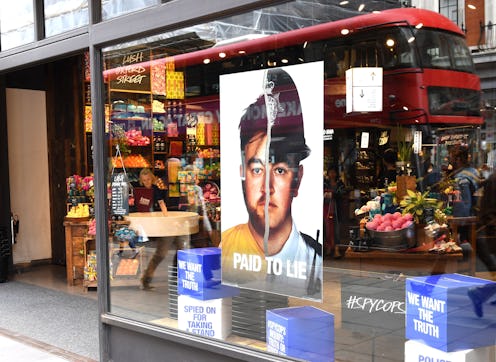News
Lush's #SpyCops Campaign Has Been Pulled & The Whole Story Is Troubling

Lush made waves earlier this month with its bold #SpyCops adverts — an awareness campaign shedding light on political activists and campaigners who have been manipulated into romantic and sexual relationships with undercover police officers. As a result of the Lush's #SpyCops campaign, employees in store have allegedly been intimidated, causing the shop to pull the ads. So what has happened?
The campaign comprises of a video being circulated on social media and displays in Lush stores shop windows. Such displays feature police-style barricade tape stating "police have crossed the line", and other slogans include "spied on for taking a stand" and "police spies out of lives." One of the more arresting images of the campaign is a split picture depicting a man, half-in and half-out of police attire, with the words "paid to lie" emblazoned across it (some of criticised the campaign for a lack of context surrounding these images, such as Nazir Afzal, the former Chief Crown Prosecutor for North-West England, writing in The Guardian).
The campaign has generated much debate, with some being supportive of Lush's work drawing attention to the issue, while others read it as an attempt to undermine police work.
More recently, it has led to staff members in Lush stores allegedly being intimidated, sometimes by ex-police officers. In one instance, an off-duty police officer reported visiting a store to speak with a manager via Twitter, resulting in the campaign materials being removed. On reaching out to Lush about their removal of the window displays, they gave me the following statement: "For the safety of our staff we have suspended the window."
The strength of the resistance to the campaign feels troubling. Calum Macleod, chair of the Police Federation of England and Wales, issued a statement on June 1: “The Lush advertising campaign is offensive, disgusting and an insult to the hard work, professionalism and dedication of police officers throughout the UK. I cannot believe that someone, somewhere, actually thought this campaign was a good idea. All it serves to do is to criticise police officers and encourage an anti-police sentiment."
The statement implies resistance to any level of criticism levelled at the police force, advocating for an un-interrogated support of all police work — which is, I think, absurd. Police work must be held accountable. And criticism of police officers duping men and women into sexual and romantic relationships predicated on deception, at a time in which we are having important and complicated conversations around consent, seems crucial.
I first became aware of the campaign after reading tweets from writer and The New Enquiry editorial board member Ayesha Siddiqi, who expressed reservations about those tweets being taken out of context, which is why I have not embedded them here. However, Siddiqi made very salient points about how Lush is not tethering any products to the campaign and so there is a seeming authenticity in their support of this cause (while also pointing out we do not know who is behind the campaign, and so do not have individual accountability).
The campaign highlights incidents in which men and women have been tricked into sometimes years-long relationships with people who are fundamentally not who they say they are, with them, as the Guardian reports, often assuming the names of dead children. Working with the organisation Police Spies Out Of Lives, Lush have shed light on the plights of women still unpacking the trauma of being so wilfully and calculatedly misled.
Environmental activist Lisa Jones (an assumed name), was victim to one of the most renowned incidents of this deception — discovering Mark Jones, her partner of six years who she met believing he was a fellow activist, was in fact PC Mark Kennedy. Kennedy, as the Guardian reports, "for seven years lived deep undercover at the heart of the environmental protest movement." "In 2010 I was in the highly bizarre and I thought unprecedented position of doubting the identity of a man I had been in a intimate relationship with for six years," Jones says, in a video made by Police Spies Out Of Lives. "Everything starts to fall apart and it starts to effect all of your memories."
A petition launched by victims of the "spycops" operations is "pressing for the current public inquiry into undercover policing to ensure that there is full disclosure of what took place, including who was targeted, by whom and how." The statement published in the Guardian continues: "This is not an attack on police; it serves to help all those in the police service who wish to uphold the highest standards of policing."
Sara Thornton, National Police Chiefs' Council Chair, issued the following statement about the campaign on June 1 when it first launched. "Undercover policing plays a critical role in gathering evidence and intelligence to protect people from harm and the work of undercover officers can, and has, saved lives.
“We fully accept that some undercover policing operations, ethics and behaviour in the past were a violation of the victims’ human rights, an abuse of police power and caused significant trauma, and we are grateful to those women who told their stories because it brought shameful practices into the light.
“Alongside the College of Policing we have already acted to prevent it happening to others, with new training, guidance and processes in place to ensure undercover operations are lawful, ethical, and proportionate.
“But while it may have been well-intended, this campaign from Lush UK is both insulting and damaging to the tens of thousands of officers who place themselves in harm’s way to protect the public on a daily basis, and who have nothing at all to do with the undercover inquiry.”
Correction: A previous version of this story mischaracterised the status of the public enquiry. It has been updated to accurately reflect its status.